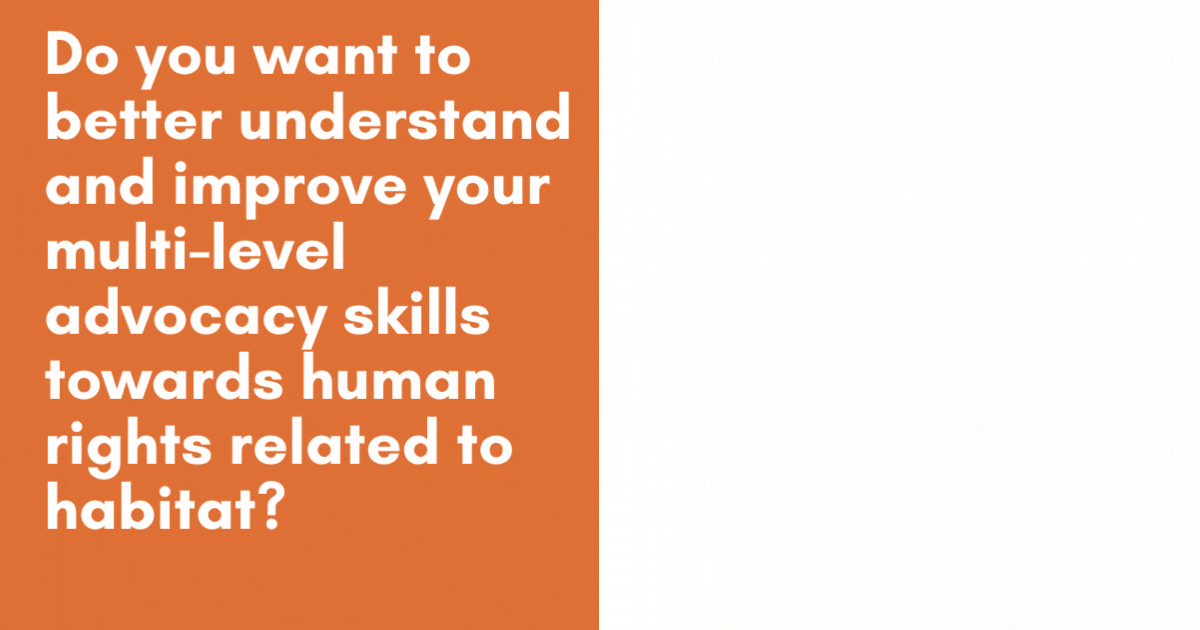Deadline: Friday 4 March, 6pm GMT
Do you want to better understand and improve multi-level advocacy skills towards human rights related to habitat?
Would you like to learn and share advocacy experiences among activists from the Global South?


What is a co-learning space?
Co-learning spaces are cross-regional, multi-session encounters that support participants to prioritise, strategise, learn and advocate together on human rights related to habitat. Co-learning spaces are based on emancipatory and intercultural learning practices, which link learning to concrete advocacy actions. They aim to support participants to build social force and speak with a strong interregional voice to impact policies and practices and effect transformative change.
Why join?
The co-learning space on multi-level advocacy is a great opportunity to learn together with other networks and organisations in HIC from Africa, Latin America and the Middle East and North Africa regions to build social force and develop a common understanding and skills related to multi-level advocacy for envisaging and strengthening joint opportunities and strategies to advocate for human rights related to habitat.
When will it take place?
The co-learning space on multi-level advocacy will be hosted online in March 2022 over a period of four weeks (Wednesday, 9, 16, 23 and 30 March). Each week will consist of an interactive live session of 2 hours via zoom plus 1 hour of your own time for preparation.
Who is organising it?
The co-learning space is facilitated by 3 HIC Members from Africa, MENA and Latin America with the support of HIC and the Knowledge in Action for Urban Equality (KNOW) programme.
Who can join?
The Co-Learning Space is open to all HIC Members, Friends and allies.

Content of each session
Session I: Understanding advocacy
This session aims to reach common understanding about advocacy emphasising its objective of influencing policy decisions. Through a case study approach, the session clarifies concepts, levels, strategies, tools, and skills needed for advocacy.
Session II: Advocacy & Human Rights Systems
The second session focuses on the importance of having a human rights approach to advocacy, differentiating State obligations from political commitments, and the responsibility of implementation that arises from them. The session explores opportunities for multi-level advocacy derived from international and regional human rights systems and discusses strategies and tools based on human rights standards.
Session III: Advocacy & the Global Development System
The third session explores multi-level advocacy opportunities derived from global development agendas relevant to habitat issues, such as the New Urban Agenda and the 2030 Agenda for Sustainable Development. This session considers a rights-based approach to development as relevant to strategise for the localization of these development agendas.
Session IV: Multi-level Advocacy, ready for practice
Building on the co-learning from previous sessions, the final session supports the development of concrete practical steps for multi-level advocacy towards habitat issues and rights, which are of interest to the participants, highlighting the definition of smart goals, adequate tools, and tactics. The session also explores the possibilities of regional and cross-regional interaction to build social force for multi-level advocacy.

How to apply:
-
- Please fill in the application form here: https://bit.ly/36w7w1u
- The deadline for submitting an application is Friday 4 March 2022, 6pm GMT.
- We will inform you about the outcome of your application by 24 February 2022
- Please note that places are limited, so we have to take several selection criteria into account, including regional and organisational diversity.
- Requirements:
- You are able to commit 3 hours per week to participate in live zoom sessions and other online co-learning activities over four consecutive weeks.
- You are confident to read, write and speak in either Arabic, English, French or Spanish.
